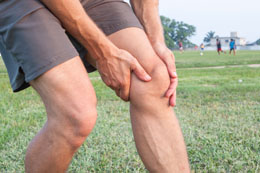Knee injuries, intermittent claudication, osteoarthritis, peripheral neuropathy, and sciatica are some of the possible causes of pain above knee cap. Go through the following article for useful information on each one of the given medical conditions.

Pain above knee cap is common. Many people suffer from it, the most common victims being old people and sportspersons. There can be several reasons behind pain in knee, particularly above the knee cap. Described below are some of the common causes of sharp pain above the knees while bending, walking, running, and doing various other activities.
Knee Injury: The knee generally gets injured by a direct physical blow. It may get injured by twisting or stretching if the joint is taken through a greater range of motion which it cannot tolerate. When the knee is stressed from a particular direction, the ligament, which tries to hold it in place against that force, gets torn. The twisting injuries can put stress on the cartilage. Meniscus may pinch the knee in between the tibial surface and the femoral condyle edges, and cause tears. Such injuries give rise to shooting pain above the knee cap.
Intermittent Claudication: This occurs with walking, squatting, etc., and eases out with rest. It is characterized by aching, tiredness, cramping, and burning pain in the legs. The pain comes and goes with movement and rest respectively. It is caused by poor circulation of blood in the arteries supplying the legs. In serious form of claudication, pain is felt even at rest. It may affect one or both knees, and often continues to aggravate over time. Many patients of this particular disorder complain only of weakness in the legs while walking. However, the condition may also give rise to impotency.
Osteoarthritis: This progressive disorder is caused by gradual loss of cartilage, and leads to the development of bony spurs and cysts at the edges of the joints. It is also known as osteoarthrosis and degenerative joint disease (DJD). It is caused by the deterioration of the cartilage which acts as a protective cushion between the bones. The cushioning is particularly important for weight-bearing joints such as the knees and hips. As this disorder progresses, pain occurs due to deformation of the bones and accumulation of fluid in the joints.
Peripheral Neuropathy: This is the malfunctioning of the nerves outside the spinal cord. Symptomized by numbness, burning pain, weakness, and loss of reflexes, it can result from problems such as traumatic injuries, metabolic problems, infections, and exposure to toxins. It can be caused by several diseases and disorders, which include diabetes, kidney failure, medication side effects, vitamin deficiency, etc. In majority of the cases, the symptoms improve with time. This improvement is fast if the underlying cause is being treated. Pain killers can be taken to ease the knee pain when bending and performing other movements.
Sciatica: This is the pain which results from the irritation of the sciatic nerve. The pain is felt originally from the lower back to behind the thigh, and then radiates down, below the knee. It radiates along the path of the sciatic nerve and its branches. This can be caused by a herniated disc which directly presses on the nerve. Sciatica can be treated by avoiding the movements which further irritate the condition. Fast relief is achieved by medication, physical therapy, and surgery, if recommended by the physician.
The above-mentioned medical conditions are only some of the causes for pain above the knee cap. There can be several other reasons behind it. You need to seek medical intervention to get the exact underlying cause determined. This is necessary, as the treatment depends upon its causative factor. Therefore, do pay a visit to a doctor and get the necessary medical assistance.
Disclaimer: This Buzzle article is solely for informative purpose and not intended to replace the advice of medical experts.


 Pain above knee cap is common. Many people suffer from it, the most common victims being old people and sportspersons. There can be several reasons behind pain in knee, particularly above the knee cap. Described below are some of the common causes of sharp pain above the knees while bending, walking, running, and doing various other activities.
Pain above knee cap is common. Many people suffer from it, the most common victims being old people and sportspersons. There can be several reasons behind pain in knee, particularly above the knee cap. Described below are some of the common causes of sharp pain above the knees while bending, walking, running, and doing various other activities.